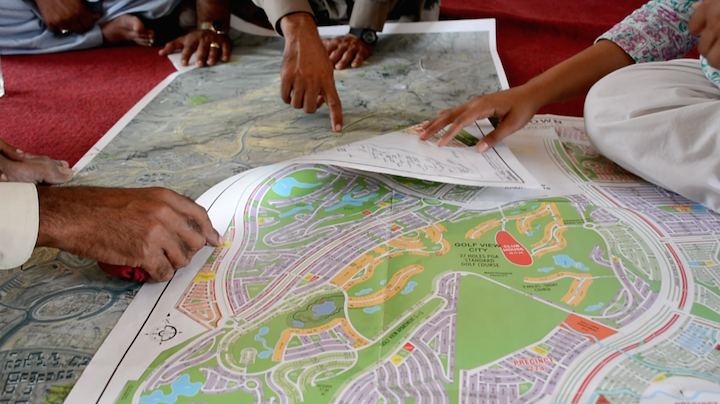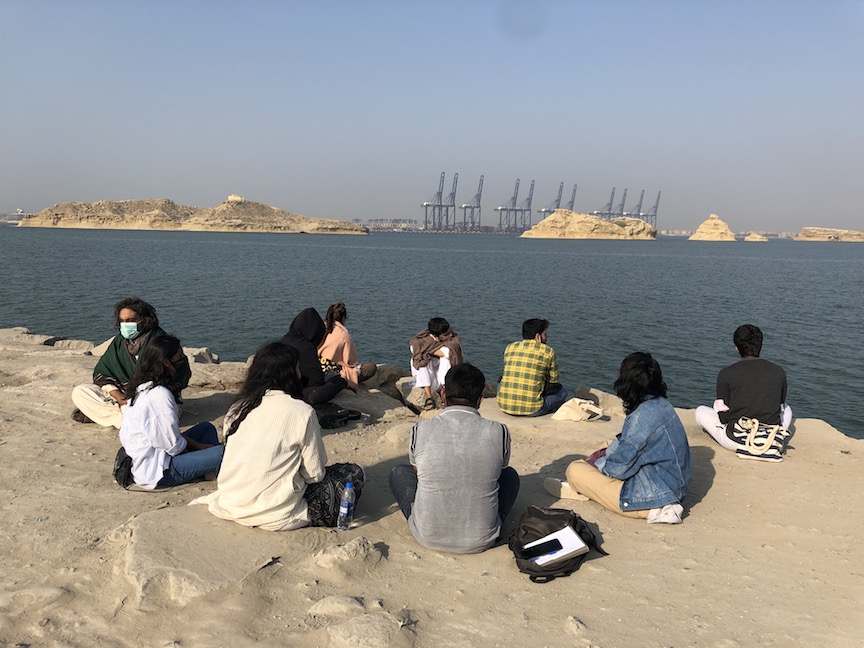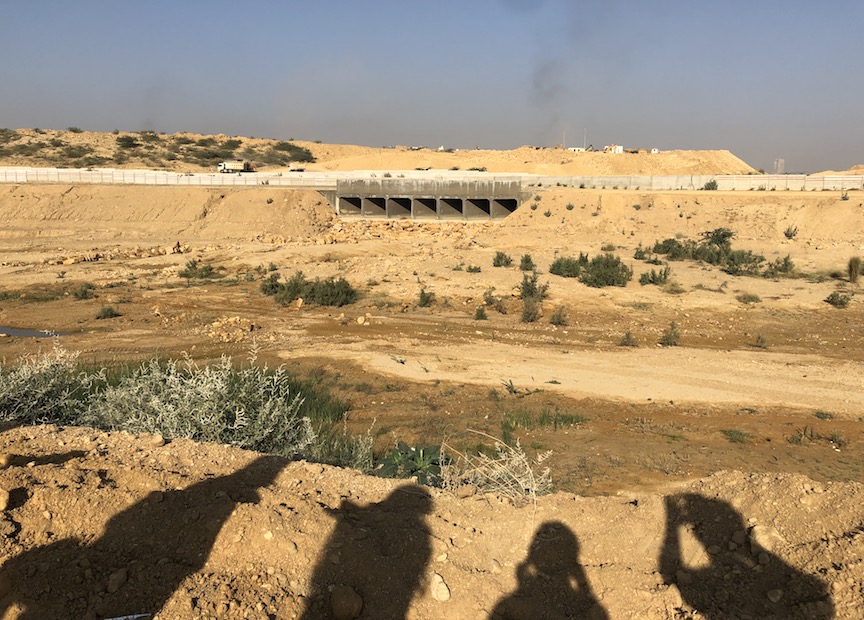Karachi LaJamia
www.karachilajamia.com
with Zahra Malkani
(2015–Present)
Karachi LaJamia is an anti-institution based in Karachi seeking to politicise art education and collectively exploring new radical pedagogies and art practices. It is a nomadic space moving outside the institution to occupy public spaces in the city as sites of study, disrupting imperial modes of knowledge production and circulation. Our sessions are site-specific and we situate ourselves in the larger social context to learn, share and produce knowledge collectively while exploring new ways of inhabiting, knowing and being with the city, and being with each other.
We seek to create non-hierarchical pedagogical environments outside of student/teacher/classroom frameworks and we work closely with multiple organisations and activists to build solidarity and alliances with ongoing struggles in the city.

Art and Politics in the City
Open Course (May–August 2015)
At a time of heightened repression and censorship, we organized 10 site-specific sessions in Karachi engaging with the pressing concerns of the artist’s relationship to politics. These sessions created a nomadic and non-hierarchical space for shared learning, shifting between different public spaces to collectively explore possibilities for the politicisation of art in the institution and the city. It was an experiment in formulating new languages, new methodologies, new spaces and networks of solidarity, and new alliances within and beyond the university.

〜
Gadap Sessions
Open Course (January–June 2016)
The Gadap Sessions was a site-specific, research-based course that used visual research methods to document the ongoing struggles around development, militarization, climate change and marginalization of indigenous communities, knowledges and histories in the city. The course took as its starting point the ongoing real-estate mega development project of Bahria Town, which is violently transforming over 35,000 acres of land in Gadap (a vast and historical neighbourhood on the outskirts of the city) and unleashing vast dispossession of indigenous Sindhi and Baloch communities to whom this land belongs.
The course brought together an interdisciplinary team of 13 artists and researchers to collect and produce multiple forms of documentation, mapping and witnessing Gadap as it struggles against erasure – its disappearing and emergent ecologies, new architectures of occupation and resistance, erased histories and persevering struggles. We mapped these intersecting geographies to refuse and contest the imperial visualities and state-sanctioned catographic portrayals of Gadap as a barrenwasteland. The course was organized in collaboration with the Karachi Indigenous Rights Alliance.
For more material visit here.

〜
The Militarized University
Research project (2017–Present)
A research project that emerges from our growing concern with the accelerated policing of university and cultural spaces under the narrative of countering violent extremism. The post-9/11 global political climate has seen an unprecedented growth in the spheres of cultural and knowledge production in Pakistan. This growth has taken place alongside a simultaneous multi-scalar expansion of the Pakistani state-military apparatus into all spheres of life as well as an influx of global capital with similar wartime agendas into the cultural and academic spheres. We trace the ways in which these dual forces have led to a pervasive culture of surveillance and securitisation under the guise of an unlimited war against terrorism.
The project has several forms and iterations, including essays, a lecture performance and talks. Link to essays:
“Imperialism, Art and Pedagogy: Notes on Knowledge Production at the Frontlines” (2017).
“The Militarised University and the Everywhere War” (2018).
〜
Hamare Siyal Rishte
Open Course (November 2021)
However much we may bury and build upon it, the landscape demands to be known. The relationship between the city dwellers of Karachi and the ecology of this land has primarily been marked by violence, both slow and spectacular, and a profound alienation. This course seeks to move beyond this painful disconnect into recognising and inhabiting, with care, our profound entanglements and shared destinies with this ecology.
The course explores a range of ongoing struggles from disappearing rivers and the climate crisis, to the razed shorelines and the contested islands of Karachi. These battles to defend the ecological body of Karachi are an ancient and ongoing pedagogy. We learn from Karachi’s rich history of resistance and refusal, turning our attention towards the dynamic, oceanic webs of relation and responsibility our aquatic landscape implicates us within.

Link to essay published in HKW’s Anthropocene Curriculum: “Sensing the Ephemeral Rivers: Notes Towards a Karachi Ecopedagogy” (2021).
〜
Stateless study: methods and practices for unlearning the state
Syllabus (2022)
This syllabus is a proposal for imagining study as a form of sociality, as a practice for remembering, and as a method for undoing and unlearning the state. Against all the ways in which the university is mobilised as a site for building, imagining and perpetuating the myths and erasures of the new nation-state, this syllabus proposes pedagogical methods and practices to unveil and destabilise the violence of the nation-building project.
At a moment when knowledge production is increasingly surveilled; public discourse closely monitored and regulated; and national histories tightly scripted and sanctified; how can we come together to imagine histories and futures otherwise, to share the risks of remembering otherwise? This syllabus emerges from experiences and experiments undertaken as part of our long-term pedagogical project Karachi LaJamia.
This syllabus was produced for the exhibition Proposals for a Memorial for Partition curated by Murtazi Vali at Jameel Arts Center Dubai.
